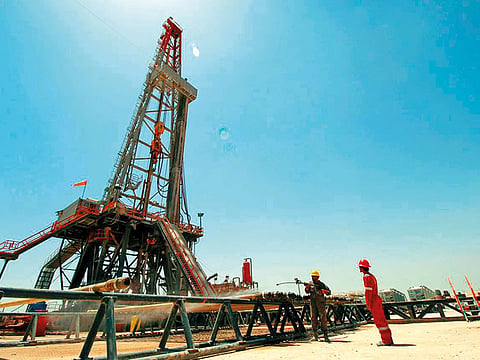Kuwait, Iraq to consider shared oilfields
Two countries should agree before the end of the year on plans for the shared fields

Kuwait: Kuwait and Iraq will soon appoint consultants to study the development of shared oilfields, Kuwaiti Oil Minister Bakhit Al Rashidi said on Wednesday.
Production from cross-border oilfields has long been a source of tension between the two Opec nations.
In the build-up to Iraq’s 1990 invasion of Kuwait, Baghdad accused Kuwait of drilling wells that crossed the border and pumped oil from Iraqi territory. Kuwait denied the charge.
The two countries should agree before the end of the year on plans for the shared fields, and also on supplying Iraqi natural gas to Kuwait, the minister said during a visit to Al Doha East power plant near the capital Kuwait City.
“The shared oilfields project aims at producing oil from border fields,” he said, adding that oil should be extracted by “one company and one team, production will be shared and the cost will be split between the two sides.” Kuwait and Iraq would pick a consultancy firm to advise on the project from a list of four candidates that the two states have already agreed on, he said, giving no further details.
A project to supply a Kuwaiti petrochemical project with gas from Iraq’s Rumaila field, near the border, is still awaiting final approval by the two countries, even though Kuwait said in 2017 that a preliminary deal had been reached on the fuel price.
The exports would pay off Baghdad’s final $4.6 billion in war reparations owed to Kuwait for the invasion and occupation between August 1990 and February 1991.
Rashidi said talks were underway to link the electricity grids of Iraq and the six-nation Gulf Cooperation Council (GCC), comprising Saudi Arabia, United Arab Emirates, Kuwait, Qatar, Oman and Bahrain.
The power shortage in Iraq sparked protests in Basra and other Iraqi cities in July, as people blamed what they called an inept and corrupt Iraqi government.
Kuwait donated 17 power generators last month to Iraq to alleviate the crisis, state-run Kuwait News Agency (KUNA) reported. “There will also be a project in the future for an electricity link between Iraq and Turkey, thus achieving a link-up between the GCC and Europe,” the minister said.



